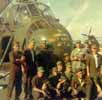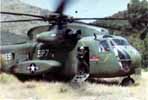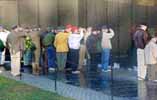Our collection of audio files. Many of these audio sounds are from our Discovery Channel Special "Vietnam's Helicopter Heroes".
|




|
| FILENAME |
LENGTH |
SIZE |
DESCRIPTION |
| marine_helos_rvn.wav |
3m09s |
1.44mb |
About Marine helicopters in Vietnam. The importance of the helicopter in the war. |
| shufly.wav |
27s |
216kb |
April 15, 1962, first squadron in Vietnam. |
| popasmoke.wav |
48s |
382kb |
Roger Herman (HMM-361) explaining what "POP A SMOKE" means. |
| uh34d.wav |
50s |
391kb |
Roger Herman (HMM-361) describing the Sikorsky UH-34D helicopter. |
| jim_farley.wav |
5m07s |
2.34mb |
 Jim Farley (HMM-163) talks about the events behind his photo (taken by Larry Burrows) on the cover of Life Magazine April 16, 1965 Jim Farley (HMM-163) talks about the events behind his photo (taken by Larry Burrows) on the cover of Life Magazine April 16, 1965 |
| huey.wav |
59s |
464kb |
Marion Sturkey (HMM-265) talks about the vulnerability of the helicopter in a combat zone and Alan Barbour (VMO-2) talks about the introduction of the UH-1E "Huey" gunship helicopter. |
| basic_rules.wav |
15s |
175kb |
Marion Sturkey (HMM-265) gives his basic rules for flying in combat. |
| pucker_factor.wav |
22s |
174kb |
Marion Sturkey (HMM-265) describes the 'pucker factor" experienced while flying in combat. [pucker.html] |
| the_bond.wav |
29s |
229kb |
Roger Herman (HMM-361) talks about the bond between the Marine grunts on the ground and the aircrews in the air. |
| ch46_ch53.wav |
40s |
318kb |
The Marines introduce the CH-46 "Sea Knight" and the CH-53 "Sea Stallion" into the war. |
| khe_sanh.wav |
2m36s |
1.19mb |
Dick Rosser (HMM-164) talks about the 77-day seige of Khe Sanh and the non-stop helicopter missions flown to keep the Marines supplied. |
| medevacs.wav |
53s |
421kb |
Roger Herman (HMM-361) talks about the importance of the medevac missions and the saying "The Best Medal is a Live Man's Smile". |
| cobra.wav |
1m27s |
683kb |
In 1967, the Marine's deadliest helicopter of the war, the "Cobra" gunship is introduced. |
| evacuation.wav |
45s |
357kb |
Gerry Berry (HMM-165) recalls picking up the Ambassador during the evacuation of Saigon in 1975. |
| evacuation2.wav |
53s |
416kb |
0800, April 30, 1975... The helicopter war was over. Gerry Berry talks about the evacuation and how it could not have been done without the helicopter. |
| sturkey.wav |
42s |
330kb |
Marion Sturkey (HMM-265) talks about the bond and the loyaly found in Vietnam. |
|
|
Below you will find the audio for two missions in the Arizona Territory, both troop inserts (mission 80/88) which happened the same day, June 18, 1970. The huey (command & control) crew logged 11.3 hours that day. It was piloted by Major Sharr, co-pilot unknown, crew chief was Dwight Williams, gunner was Mike Sprinkle, and ground unit commander (Campus Queen call sign) onboard was a colonel who's first name was Bill. The audio was taped by Dwight Williams.
A list of call signs on the first and/or second insert include: CHATTERBOX (HMM-262?) - 6, 10, 14, 15, 24, 41 and 56. SCARFACE (HML-367) - 4, 5, 6, 11, 20, 32, 39, 41, 56. DIMMER (HMH-463?) - 1. And COMPRISE (HML-167) - 3. Keep in mind that some of the call signs were flight leaders, so other aircraft are probably involved. For instance, Chatterbox 15 was a flight of three. Also note that the audio is not in real time, the guy who made it shortened-up the time between transmissions.
Please contact Dwight Williams with comments or feedback.
|
|
| mission1.mp3 |
19min |
18mb |
This mission is a troop insert into an area about two miles west of LZ Baldy. Turned out to be a base camp. As you can tell on the tape, gooners with packs and rifles were skying in all directions when the 46's landed on top of 'em. Grunts found rice caches, medical supplies, packs, gas masks, etc. Huey crew got several, but tally for the insert is unknown. I know the cobra's had a pretty good workout.
|
| mission2.mp3 |
22min |
21mb |
This mission covers another insert near the Liberty Bridge, which I believe was near our base at An Hoa. A chu hoi led the grunts to a VC propaganda leader on this one. A medevac situation developed on this insert when four grunts were wounded by a booby trap, and another was injured somehow. Grim Reaper 14 was the ground unit call sign requesting the medevac. Note that the phrase "POP-A-SMOKE" was used several times.
|
|

